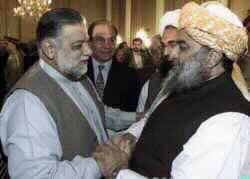- Author:
& News Agencies - Section:
WORLD HEADLINES
- Hajj & Umra WORLD HEADLINES
Pakistan Islamists Reject U.S. Help in Terror Hunt

The hard-line Islamic bloc set to govern the strategic Pakistani province bordering Afghanistan said Monday local authorities did not need U.S. support to hunt down al Qaeda and Taliban operatives. The comments, by a senior leader of the Muttahida Majlis-e-Amal (MMA) coalition, came as the provincial assembly of the North West Frontier Province (NWFP), where the religious right has an outright majority, was sworn in.
The MMA posted huge gains in an October election by tapping anti-U.S. sentiment, especially in areas near the Afghan border.
That is where American troops are hunting for members of Afghanistan's former Taliban regime and the al Qaeda network.
The MMA's gains raised concern in the West that the six-party alliance, which includes fiery pro-Taliban clerics, could undermine Islamabad's support for the U.S.-led war on terror in Pakistan and neighboring Afghanistan.
The MMA, likely to formally take power in the NWFP next week, has also vowed to push through a strict Islamic social agenda which could affect education, particularly of girls, the dress code and media access.
"There is no need for help from American forces or FBI agents or other U.S. agencies," said Liaquat Baluch, deputy head of the Jamaat-e-Islami party which is in the MMA.
"If there is a need to control terrorism, then Pakistani forces are in a position to control these people, and there is no need for support from outside," he told Reuters.
But a political analyst with good knowledge of Islamic groups in Pakistan said there was little the MMA could do to hamper the U.S. pursuit of targets along the Afghan-Pakistan border.
The NWFP government has little say in Federally Administered Tribal Areas (FATA), where many Taliban and al Qaeda fighters are likely to have fled from Afghanistan and where Pakistani paramilitary forces are cooperating with U.S. personnel.
Even within the NWFP, local government's powers are limited.
"The scope of the MMA's authority in NWFP is limited, and excludes the use of the armed forces," said the analyst, who asked not to be named.
"Except for controlling the police, all they can do is bring social changes like forcing bureaucrats to attend prayers."
ANTI-AMERICAN SENTIMENT
On a national level, the new pro-military government led by Prime Minister Mir Zafarullah Khan Jamali has stressed it wants to continue President Pervez Musharraf's key foreign and economic policies now that civilian rule has been restored three years after a military coup.
"I would like to draw your attention to the observation made by the prime minister that there would be continuity in Pakistan's foreign policy," Foreign Ministry spokesman Aziz Ahmed Khan told a news briefing.
Musharraf has enhanced his own powers, extending his term by five years and giving himself the right to dismiss parliament, thereby reassuring Western leaders who count him as a key ally in the international anti-terror campaign.
But the rise of the religious right in Pakistan underlines the resistance in many areas to Musharraf's decision to back the U.S. campaign in Afghanistan, in contrast to Pakistan's support for the Taliban until last year's September 11 attacks.
At the opening of the NWFP provincial assembly in Peshawar Monday, members held prayers for Mir Aimal Kansi, the Pakistani executed this month in the United States for killing two CIA employees who has been hailed as a hero at home.
The fact that the tribal areas and much of NWFP are already deeply conservative means that the MMA's social agenda is seen as having only a limited impact on the lives of ordinary people.
"The MMA just has a finger in the pie of power now," the analyst explained. "Most people in the tribal areas and in some districts of the NWFP are already trying to follow sharia law."
Provincial assemblies were sworn in Monday in the NWFP and the most populous Punjab province. The other two provinces, Sindh and Baluchistan, follow later this week.
PHOTO CAPTION
Prime Minister of Pakistan Mir Zafarullah Jamali (L) greets Fazal-ur-Rehman, a leader of the Muttahida Majlis-e-Amal (MMA), an alliance of six Islamic parties, after oath taking ceremony in Islamabad November 23, 2002. REUTERS/B.K.Bangash/Po
Related Articles
 Hajj virtues
Hajj virtues
-
School of Faith in Ten Days of Thul-Hijjah
The believing human self needs strong provocations in order to awaken whenever it is enveloped by laziness in...
-
The Status of Hajj in Islam
Hajj is the fifth pillar of Islam; Allah, The Exalted, ordained it in the ninth year after Hijrah (the Prophet's,...
-
School of Faith in Ten Days of Thul-Hijjah
The believing human self needs strong provocations in order to awaken whenever it is enveloped by laziness in relation...


 Home
Home Discover Islam
Discover Islam Quran Recitations
Quran Recitations Lectures
Lectures
 Fatwa
Fatwa Articles
Articles Fiqh
Fiqh E-Books
E-Books Boys & Girls
Boys & Girls  Hajj Rulings
Hajj Rulings Hajj Fatwas
Hajj Fatwas












